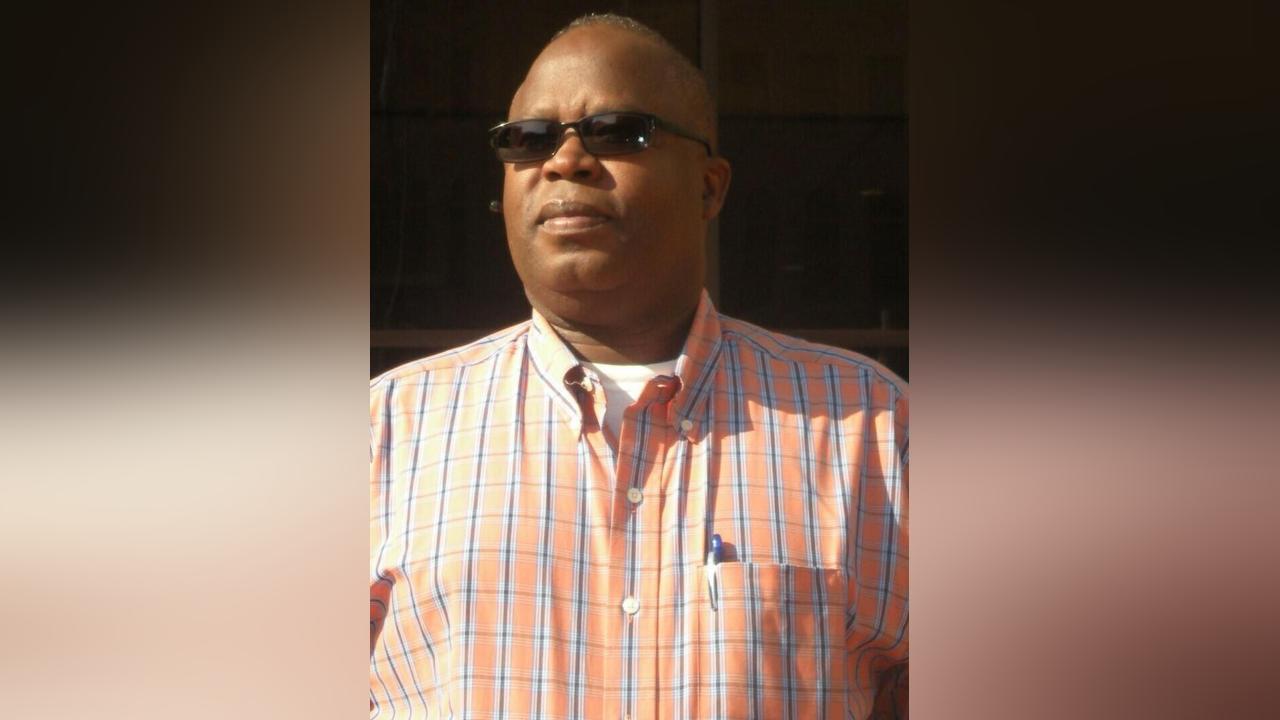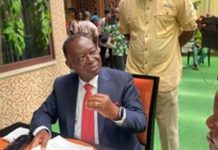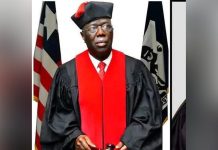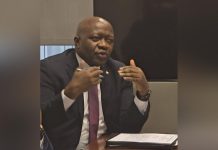Africa-Press – Liberia. The incompetent and the corrupt should not cross over into the second quarter of the 21st century: corruption and incompetence must remain in the past, come December 31, 2025. No Crossing Over:
“The danger of combining power, arrogance, and incompetence; the idea of incompetence as a significant problem; the potential for incompetence to cause suffering; and the view that governments can be unqualified to solve problems due to incompetence and other factors.” Unknown.
Incompetence among national leaders and the faith they can still inspire; violence to incompetence and identify incompetence as a domestic threat.” Unknown.
“Incompetence and lack of value; the dangers of combining power with incompetence, describing incompetence as a true crisis, and noting that those who are useless often hide their incompetence behind authority.” Unknown.
“Incompetence to government unresponsiveness, corruption, danger, suggesting rebellion stems from indifference and incompetence; identifying ignorance, superstition, and incompetence as threats to any society.” Unknown.
“Incompetence among national leaders is also noted, along with the blind faith they can still inspire; the idea that public opinion in the country won’t tolerate an incompetent or unworthy official.” Unknown.
“Some government systems and bureaucracies; one perspective is that in a hierarchy, some employees tend to rise to their level of incompetence.” Unknown.
“The combination of incompetence and indifference is seen as capable of causing significant suffering.” Unknown.
“Power doesn’t corrupt men, but rather that fools in positions of power corrupt power itself.” Unknown.
“The lack of accountability for some unelected government officials is seen as a reason for their low public esteem, and cliques are described as refuges for incompetence, fostering corruption, disloyalty, and cowardice, thus being a burden to a country’s progress.” Unknown.
“Once talent is given a fair chance, it does not level the intellectual, academic, labor, management, leadership, etc., playing field; it rewrites the future.” -Austin S Fallah
By: Austin S Fallah – A True Son of the Planet Earth Soil: A Policy Analyst and A Political Therapist: [email protected]
As Liberia stands at a crucial juncture in its history, the need for decisive action to dismantle the existing structures of some ineffective cabinet ministers has become increasingly urgent.
The call to dismiss “office and car seat-warming Ministers, Managing Directors, and Heads of Public Corporations and Parastatals” who fail to contribute/add value meaningfully to national progress resonates not just as a slogan but as a necessary response to a long-standing crisis.
President Joseph N. Boakai and Vice President Jeremiah K. Koung find themselves at a pivotal moment: their leadership offers a unique opportunity to reshape Liberia’s future, but only if they act resolutely to address the entrenched corruption and incompetence that have stymied the nation’s potential.
The Plague of Leadership Ineffectiveness:
The current state of leadership within Liberia’s public sector is a dire reflection of systemic issues that have historically plagued the nation.
Many government officials have become synonymous with stagnation rather than progress; they resemble seat-warmers who occupy their positions not to drive meaningful change but to maintain the status quo.
While the President, Ministers of Foreign Affairs, and Finance, and Development Planning are making headway in rejuvenating Liberia’s potential by engaging investors and the diplomatic community to look Liberia’s way on the international scene, other Liberia cabinet ministers are wasting state resources without adding value to the nation’s well-being.
Why should a minister of agriculture and his technocrats sit in Monrovia when agriculture is in the hinterland?
Why would a Minister of Commerce and Industry and the Chairman of the National Investment Commission sit in Monrovia rather than being on the international roads, selling Liberia to investors as the world becomes more competitive? To name a few.
These officials need to follow the footsteps of their colleagues by adding value to their positions so that history will judge them kindly or remember them hopefully.
Such individuals, far from serving the interests of the people, are often embroiled in corrupt practices that exacerbate poverty and inequality.
This corruption, often referred to as a “money-eating, cancerous virus,” undermines national agendas and serves as a significant barrier to the progress Liberia desperately needs.
Corruption in governance creates a vortex that sucks away resources meant for development, leaving the populace languishing in poverty.
According to Transparency International, corruption is not just an ethical issue; it is a survival problem for many Liberians who are unable to access basic services due to misallocated funds and fraudulent practices.
Suppose President Boakai and Vice President Koung are to pave the way for a brighter future. In that case, they must distance themselves from political figures who embody these detrimental traits.
Voicing the Discontent: A Call for Change:
The citizens of Liberia are awakening to the realization that their leaders must be held accountable for their actions.
Young people, in particular, have expressed a strong desire for change. They represent a generation that refuses to be bound by the failures of the past.
When the current legislative assembly and public sector managers are viewed through a contemporary lens, it becomes evident that many representatives lack the requisite vision and expertise to lead Liberia into a promising future.
As the nation looks towards the 2029 elections, now is the time for citizens to take a critical appraisal of their officials, advocating for a shift toward those who demonstrate integrity, vision, and a commitment to the people’s welfare.
A survey by the Liberia Institute of Statistics and Geo-Information Services illustrates that 85% of young Liberians feel disillusioned with their current officials and are calling for a new generation of leaders.
This sentiment is mirrored in various grassroots movements across the country, advocating for transparency, accountability, and ethical governance.
Liberians are realizing that their fate is in their hands; they can vote out incompetent and corrupt legislators and replace them with visionaries and innovators who can propel the nation forward.
The Power of Elimination: Clearing the Path for Progress:
In a practical sense, the dismissal of ineffective officials is essential to clearing the path for quality governance.
Establishing a governance structure that is responsive to the needs of the people is critical.
Suppose President Boakai and Vice President Koung implement a thorough assessment of public officials and remove those who can not meet the demands of their roles and modern-day leadership trajectory. In that case, they will set a precedent for a meritocracy rather than a kleptocracy.
This shift is particularly vital in a nation where historical grievances surrounding leadership and public trust remain pronounced.
The notion of “leave them behind on or before December 31, 2025, not taking them into the second quarter of the 21st century” signifies an understanding that progress requires a commitment to ethical leadership.
The concept of leadership must evolve from one of entitlement to one of service.
This means promoting leaders who have a proven track record of making positive contributions to their society/nation/communities and who possess the skills necessary for navigating Liberia’s complexities.
By expelling those who harm the public trust and replacing them with well-educated, country-loving, and inspired leaders, the Liberian government can begin to re-establish and enforce its legitimacy.
Such actions will send a powerful message that corruption will no longer be tolerated and that the people’s needs will take precedence.
Building a Future: Embracing Youth Leadership and Innovation:
The new leaders/officials of Liberia must not only be visionary in their approach but must also prioritize the empowerment of the young people.
As Liberia grapples with high unemployment rates and limited opportunities, nurturing a generation of young, capable leaders is essential.
The future must entail creating avenues for young people to learn, engage, and ascend to influential positions within the government and society at large, free from nepotism, sectionalism, tribalism, and other “isms” that would undermine national unity.
This is not merely a political necessity; it is a moral imperative that ensures the nation’s growth and stability.
Investment in education must be prioritized, as it serves as the foundation for developing skilled, competent individuals who can compete on global platforms.
Furthermore, programs that promote entrepreneurship and innovation should be expanded, enabling Liberia’s young people to make meaningful contributions to the economy.
By integrating young leaders into the national dialogue, Liberia stands to benefit from fresh perspectives, innovative solutions, and an energized population eager to uplift their country.
The Road Ahead: From Pain to Promise:
In the grand scheme of national governance, the dismissal of corrupt and ineffective leaders is not the cessation of political engagement but rather the dawn of a new era of potential.
The road ahead is fraught with challenges, but it is also paved with immense possibilities.
Liberians must work collectively to foster a culture that champions accountability, transparency, and service to the nation.
President Boakai and Vice President Koung have a rare opportunity to define their legacy through their commitment to reform.
By taking bold steps to alter the landscape of leadership, they have the potential not only to transform Liberia’s governance but also to inspire a generation to dream of and work towards a brighter future.
Engaging with the populace to reassure them of their agency in the democratic process will be vital.
It is not enough for leaders to replace the old with the new; they must also embolden citizens to actively participate in shaping their nation.
The upcoming elections in 2029 provide an essential platform for this engagement, as expectations are set for a leadership that reflects the aspirations and hopes of the Liberian people.
A Collective Endeavor:
The urgent call to dismiss ineffective/incompetent officials in Liberia is not merely a critique but a clarion call for a rejuvenated governance structure that prioritizes the needs of the people.
President Boakai and Vice President Koung must take this plea seriously, recognizing that real change begins with a commitment to upholding values of service and integrity in leadership.
As Liberia sets its sights on a new era in the second quarter of the 21st century, citizens must hold their leaders accountable, ensuring the nation does not succumb to historical patterns of corruption and incompetence.
Today’s young people hold the key to a prosperous tomorrow. As the populace rallies for change, it becomes clear that the path to national progress lies in a collective effort to foster governance that nurtures and empowers rather than binds and stifles.
With courage and determination, Liberia can emerge from the shadows of its past and stride confidently into a future that embraces its potential for greatness.
Source: Liberia news The New Dawn Liberia
For More News And Analysis About Liberia Follow Africa-Press






